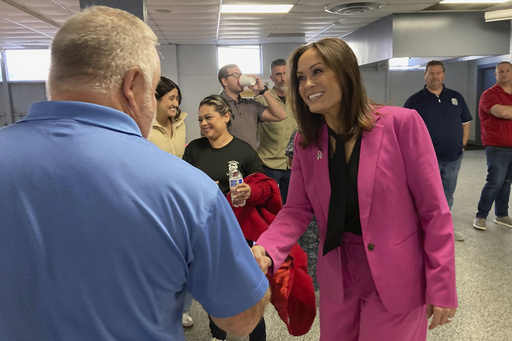LOUISVILLE, Ky. — Democratic Lieutenant Governor Jacqueline Coleman took to the campaign trail on Monday, voicing strong opposition to a proposed ballot measure aimed at allowing state funds to be allocated for students attending private and charter schools. This issue strikes a personal chord for Coleman, a former public school teacher and administrator, who has emerged as a prominent figure opposing the statewide ballot initiative. Should a simple majority of Kentucky voters endorse the measure next month, it would eliminate unconstitutional restrictions that have prevented the state’s Republican-controlled Legislature from diverting taxpayer dollars to support private school education.
At a union hall in Kentucky’s largest city, Coleman cautioned that the approval of the measure could have severe repercussions for public schools, particularly in rural communities. “We simply don’t have the resources to fund two separate systems of education,” said Coleman. “We shouldn’t be doing so because public funds should remain with public schools.”
As there are no major statewide races on the ballot, the school choice proposal has become the central topic in the fall campaign across Kentucky. Both proponents and opponents have invested in TV advertisements, grassroots initiatives, and accusations of misinformation swirling around the topic. Supporters of the measure, known as Amendment 2, include notable figures like Republican U.S. Senator Rand Paul. They argue that the measure would enhance parental choice in selecting educational institutions suited to their children, a type of educational freedom they say already exists in many other states.
“Every child in every neighborhood, of every color, class, and background deserves a school that will help them succeed,” Paul stated. He emphasized that Amendment 2 would facilitate students learning in the most conducive environments possible and would help break the cycle of poverty that too often hinders children from reaching their full potential. Supporters assert that increased competition in education would lead to improved student achievement outcomes.
“The motivations created by choice encourage the public system to elevate its standards,” remarked Jim Waters, president of the Bluegrass Institute for Public Policy Solutions, a Kentucky-based think tank advocating for free-market principles. He highlighted recent statewide testing results, which indicated that over half of public school students taking these exams did not achieve proficiency in math, reading, or science.
Proponents argue that permitting public funding for private schools would particularly aid low- and middle-income families who currently cannot afford private tuition. Coleman, however, countered this argument, predicting that vouchers wouldn’t sufficiently cover the cost of private school enrollments. “So where will the shortfall for families who can’t afford to send their kids to private schools come from?” she challenged, suggesting that most voucher funds would likely benefit students already enrolled in private institutions.
The measure was placed on the ballot by Republican legislators and does not establish specific guidelines on how the funds could be redirected. Rather, it would allow the Legislature to consider developing such policies to facilitate support for students attending private schools. Coleman expressed concerns that if the proposal passes, it would provide lawmakers with an unrestricted opportunity to back private education by reallocating significant amounts of public tax revenues. “We must defeat Amendment 2 because Kentucky’s public schools, which serve 90% of our students, deserve nothing short of excellence,” she asserted.
Advocates for the amendment pointed towards increased public school funding as a testament to lawmakers’ dedication to education. However, the funding levels were notably lower than those proposed by Democratic Governor Andy Beshear. The school-choice debate holds particular significance in predominantly Republican rural Kentucky, where public schools act as crucial community hubs and frequently serve as major employers. Coleman, hailing from rural Kentucky, directed her address towards small-town constituents while in Louisville, stating, “It is no secret that rural schools stand to suffer the most. Many rural communities lack private educational options, which means the funds that should support those communities will instead be funneled to private schools in other parts of the state.”
This debate surrounding school choice has been an ongoing topic for years within Kentucky, particularly as Republicans have expanded their influence in the legislature. Attempts to broaden school choice in the past were thwarted by legal challenges, leading to the push for a ballot proposal that would amend the state constitution. Coleman echoed concerns raised by opponents, such as Allen Schuler from the Kentucky Retired Teachers Association, who articulated that the objective of the measure was to alter the existing regulations.
An earlier initiative supported by the GOP to grant tax credits for donations that would fund private school tuition was invalidated by the Kentucky Supreme Court in 2022. Currently, the state constitution only permits taxpayer money to support “common schools,” which has been interpreted by state courts as exclusively public. Coleman, having been elected alongside Governor Beshear — a prominent adversary of the measure — reaffirmed her commitment to campaign against Amendment 2. She announced plans to actively speak out against the potential harmful impacts of the measure on children, educational institutions, and local communities leading up to Election Day. “I will go anywhere, anytime, any place and speak about the damage that Amendment 2 will do to our kids, our schools, and our communities,” she stated.



